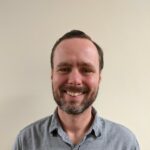In designing a certificate program to enrich the clinical capabilities of psychology doctoral students, we’ve taken what we do best at the National Register—presenting complex clinical problem-solving in easily digestible formats—and applied it to the clinical development of psychology doctoral students. Certificate program live training sessions are open to all psychology doctoral students with no charge to attend, but only members of the National Register Associate Program earn the certificate after attending all three training sessions.
The second installment of this certificate program is a three-part series on psychosis presented by Dr. Kate Hardy, Carlos Larrauri, Dr. Sripriya Chari, Drew Musa, Dr. Melanie Lean, Timothy Kelly, and Dr. Katie Eisen. This program will prepare psychology doctoral students to identify, assess, and conceptualize psychosis.
If you’ve missed a session, links are posted below so that National Register Associate members can log in and watch the session. If you have not yet joined the Associate Program, it’s a quick and easy process: JOIN NOW!
Psychosis is a frequently misunderstood clinical presentation and psychologists often feel unequipped to address psychotic symptoms without specialist training. However, doctoral students may encounter individuals presenting with psychotic symptoms (either emerging or established) in many different clinical placements. Framed through a lived experience lens this three-session series will focus on assisting psychology doctorate students to identify, assess, and conceptualize psychosis and will highlight key skills and resources available to support individuals experiencing psychotic symptoms.
Session 1: Psychosis: Assessment and Identification
National Register Associate members can log in and watch the session here.
Presentation by Dr. Kate Hardy, Carlos Larrauri, and Dr. Sripriya Chari (1 hour)
Roundtable Discussion (30 minutes)
This session will focus on key skills to support clinicians to identify and assess psychotic symptoms. Presented in the context of a recovery framework, and drawing from lived experience and clinical perspectives, the session will explore psychosis as existing on a continuum and provide participants with non-stigmatizing language and tools to support discussion of psychotic symptoms. The importance of early assessment and identification will be highlighted with a discussion about referral pathways to early intervention for psychosis services.
Session 2: Psychosis: Normalizing, Befriending, and Curiosity
National Register Associate members can log in and watch the session here.
Presentation by Dr. Kate Hardy, Drew Musa, and Dr. Melanie Lean (1 hour)
Roundtable Discussion (30 minutes)
This session will highlight the importance of befriending and normalizing in working with psychosis as well as understanding psychosis within a cultural framework. Common challenges to engagement will be discussed and tools to address this presented.
Session 3: Psychosis: Formulation and Skills
National Register Associate members can log in and watch the session here.
Presentation by Dr. Kate Hardy, Timothy Kelly, and Dr. Katie Eisen (1 hour)
Roundtable Discussion (30 minutes)
This session will focus on utilizing the core skill of formulation to support understanding of the development and maintenance of psychotic symptoms. The role of trauma in the development of psychosis will be highlighted and pathways from trauma experiences to psychosis explored. Common skills and their application to psychotic symptoms will be discussed.
 Kate Hardy, Clin.Psych.D, is a Clinical Professor at Stanford University and California Licensed Psychologist who has specialized in working with individuals with psychosis for over 15 years in research, service development and clinical settings. Dr. Hardy received her doctorate in clinical psychology from the University of Liverpool, United Kingdom and completed her post-doctoral fellowship at UCSF. She is the Co-Director of the Stanford Department of Psychiatry and Behavioral Sciences INSPIRE Early Psychosis clinic and co-leads the national Psychosis-Risk and Early Psychosis Program Network (PEPPNET). She provides psychosocial interventions for individuals with psychosis, and their families, and is a nationally renowned trainer in CBT for psychosis and early psychosis models of care.
Kate Hardy, Clin.Psych.D, is a Clinical Professor at Stanford University and California Licensed Psychologist who has specialized in working with individuals with psychosis for over 15 years in research, service development and clinical settings. Dr. Hardy received her doctorate in clinical psychology from the University of Liverpool, United Kingdom and completed her post-doctoral fellowship at UCSF. She is the Co-Director of the Stanford Department of Psychiatry and Behavioral Sciences INSPIRE Early Psychosis clinic and co-leads the national Psychosis-Risk and Early Psychosis Program Network (PEPPNET). She provides psychosocial interventions for individuals with psychosis, and their families, and is a nationally renowned trainer in CBT for psychosis and early psychosis models of care.
 Carlos A. Larrauri serves on the Board of Directors for the National Alliance on Mental Illness and NAMI Miami-Dade County. Diagnosed with schizophrenia at 23 years of age, access to affordable health care, community-based treatments, and early intervention afforded him the best opportunity for recovery. Mr. Larrauri is board certified as a Family Nurse Practitioner and Psychiatric Mental Health Nurse Practitioner and formerly lectured at the University of Miami and Miami Dade College.
Carlos A. Larrauri serves on the Board of Directors for the National Alliance on Mental Illness and NAMI Miami-Dade County. Diagnosed with schizophrenia at 23 years of age, access to affordable health care, community-based treatments, and early intervention afforded him the best opportunity for recovery. Mr. Larrauri is board certified as a Family Nurse Practitioner and Psychiatric Mental Health Nurse Practitioner and formerly lectured at the University of Miami and Miami Dade College.
Mr. Larrauri is currently pursuing a law degree and concurrent master in public administration at the University of Michigan Law School and the Harvard Kennedy School as a Zuckerman Fellow. He aspires to interface clinical practice, health policy, and research to reduce health inequities for people living with mental illness. To learn more about Carlos and his work, visit https://www.carloslarrauri.com/ or visit his LinkedIn.
 Dr. Sripriya (Priya) Chari is a CA Licensed Clinical Psychologist and Clinical Assistant Professor working with the INSPIRE Clinic at Stanford. Dr. Chari’s clinical interests lie in early identification of the psychosis risk syndrome and providing evidence based psychotherapeutic interventions from a recovery-oriented perspective. Prior to the INSPIRE Clinic, Dr. Chari was a clinical assessor for the North American Prodrome Longitudinal Study, aimed at studying the predictors for conversion to psychosis of youth at clinical high risk for psychosis. She also worked for Santa Clara County Department of Mental Health, in inpatient, outpatient, and forensic settings providing psychotherapy and assessment services.
Dr. Sripriya (Priya) Chari is a CA Licensed Clinical Psychologist and Clinical Assistant Professor working with the INSPIRE Clinic at Stanford. Dr. Chari’s clinical interests lie in early identification of the psychosis risk syndrome and providing evidence based psychotherapeutic interventions from a recovery-oriented perspective. Prior to the INSPIRE Clinic, Dr. Chari was a clinical assessor for the North American Prodrome Longitudinal Study, aimed at studying the predictors for conversion to psychosis of youth at clinical high risk for psychosis. She also worked for Santa Clara County Department of Mental Health, in inpatient, outpatient, and forensic settings providing psychotherapy and assessment services.
 Drew Musa is a NYC based Peer Specialist working with young adults living and thriving with varying mental health diagnoses. Diagnosed with schizophrenia at 21 years, he was fortunate to find support at OnTrack New York Washington Heights clinic where he had his first interaction with a peer specialist as part of his comprehensive care team. This interaction was key in inspiring Drew to seek his own peer specialist training with Howie the Harp Advocacy Center. Drew has particularly enjoyed working with young adults and colleagues from marginalized backgrounds and examining the intersections of being Black while seeking, receiving and providing mental health care. He is also producer and co-host of the Black Peer Perspective Podcast – a weekly educational podcast focusing on the unique experiences of Black peers, consumers and other stakeholders in the mental health field.
Drew Musa is a NYC based Peer Specialist working with young adults living and thriving with varying mental health diagnoses. Diagnosed with schizophrenia at 21 years, he was fortunate to find support at OnTrack New York Washington Heights clinic where he had his first interaction with a peer specialist as part of his comprehensive care team. This interaction was key in inspiring Drew to seek his own peer specialist training with Howie the Harp Advocacy Center. Drew has particularly enjoyed working with young adults and colleagues from marginalized backgrounds and examining the intersections of being Black while seeking, receiving and providing mental health care. He is also producer and co-host of the Black Peer Perspective Podcast – a weekly educational podcast focusing on the unique experiences of Black peers, consumers and other stakeholders in the mental health field.
 Melanie Lean, Clin.Psych.D., is a Californian licensed psychologist and the assistant director of research in the INSPIRE clinic, Stanford. She provides Cognitive Behavioral Therapy for psychosis (CBTp) within the recovery oriented and trauma informed framework of the INSPIRE clinic. Dr Lean received her doctorate from University College London, UK and completed her postdoctoral fellowship at Stanford University. Dr Lean has over 15 years’ experience in clinical research, twelve of those in mental health working across a range of settings and populations. She has experience working in co-produced services in the UK at the mental health charity, MIND in Camden, including co-facilitating Hearing Voices and Voice Collective groups to support young people who hear, see or sense things that other’s don’t.
Melanie Lean, Clin.Psych.D., is a Californian licensed psychologist and the assistant director of research in the INSPIRE clinic, Stanford. She provides Cognitive Behavioral Therapy for psychosis (CBTp) within the recovery oriented and trauma informed framework of the INSPIRE clinic. Dr Lean received her doctorate from University College London, UK and completed her postdoctoral fellowship at Stanford University. Dr Lean has over 15 years’ experience in clinical research, twelve of those in mental health working across a range of settings and populations. She has experience working in co-produced services in the UK at the mental health charity, MIND in Camden, including co-facilitating Hearing Voices and Voice Collective groups to support young people who hear, see or sense things that other’s don’t.
 Timothy Kelly is the Chief Clinical Officer of InterAct of Michigan where he oversees a variety of evidence based programs including Coordinated Specialty Care for psychosis, Assertive Community Treatment, and Dialectical Behavior Therapy. Timothy is a licensed professional counselor and achieved candidacy for a PhD in Counselor Education and Supervision from The University of Iowa. In recovery from experiences under the description of schizoaffective disorder, Timothy began his journey in mental health services as a teenager experiencing psychosis. He spent a number of years involved in grassroots activism in the recovery and lived experience movements, organizing community advocacy and support networks, and presenting on lived experience perspectives in mental health. In addition to drawing on lived experience of psychosis as a therapist and clinical leader, he has drawn on that experience to inform mixed media art projects, songwriting, peer reviewed research on psychosis, and facilitating peer led groups such as The Hearing Voices Network.
Timothy Kelly is the Chief Clinical Officer of InterAct of Michigan where he oversees a variety of evidence based programs including Coordinated Specialty Care for psychosis, Assertive Community Treatment, and Dialectical Behavior Therapy. Timothy is a licensed professional counselor and achieved candidacy for a PhD in Counselor Education and Supervision from The University of Iowa. In recovery from experiences under the description of schizoaffective disorder, Timothy began his journey in mental health services as a teenager experiencing psychosis. He spent a number of years involved in grassroots activism in the recovery and lived experience movements, organizing community advocacy and support networks, and presenting on lived experience perspectives in mental health. In addition to drawing on lived experience of psychosis as a therapist and clinical leader, he has drawn on that experience to inform mixed media art projects, songwriting, peer reviewed research on psychosis, and facilitating peer led groups such as The Hearing Voices Network.
 Katie Eisen, PhD, is a Clinical Assistant Professor and CA Licensed Clinical Psychologist working with the INSPIRE Clinic at Stanford. Her research and clinical interest center on recovery-oriented therapeutic interventions for individuals experiencing psychosis. Dr. Eisen received her bachelor’s degree from Cornell University, and her PhD from the University of Connecticut, and completed postdoctoral training at Stanford University. Before coming to the INSPIRE Clinic, Dr. Eisen worked for over 10 years as a psychologist on the acute inpatient psychiatric units at Stanford Health Care. Dr. Eisen has provided training and consultation in CBT for psychosis (CBTp) for providers working in both inpatient and outpatient clinical settings.
Katie Eisen, PhD, is a Clinical Assistant Professor and CA Licensed Clinical Psychologist working with the INSPIRE Clinic at Stanford. Her research and clinical interest center on recovery-oriented therapeutic interventions for individuals experiencing psychosis. Dr. Eisen received her bachelor’s degree from Cornell University, and her PhD from the University of Connecticut, and completed postdoctoral training at Stanford University. Before coming to the INSPIRE Clinic, Dr. Eisen worked for over 10 years as a psychologist on the acute inpatient psychiatric units at Stanford Health Care. Dr. Eisen has provided training and consultation in CBT for psychosis (CBTp) for providers working in both inpatient and outpatient clinical settings.
Please note: This program is not offered for continuing education.
Associates May Watch Videos